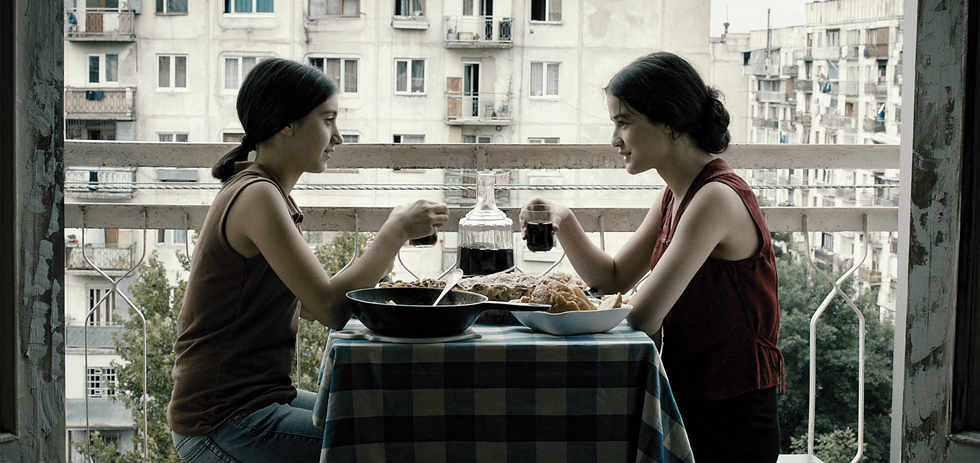
Nana Ekvtimishvili and Simon Gross’ film In Bloom tells the story of two fourteen-year-old girls growing up in Georgia in 1992, during the Georgian Civil War. Eka (Lika Babluani) and Natia (Mariam Bokeria) are best friends. In the opening scene, there is a close up shot of Eka on the bus. Over the radio, we hear a man saying that everyone in Georgia should be armed. It is followed by the afterthought, “This doesn’t mean that men should mug people.” It’s an ominous statement. It alludes to the dangerous world the girls inhabit, a world in the midst of upheaval and unrest. It also foreshadows the film’s dramatic turning point, which occurs when Lado (Data Zakareishvili), an older boy smitten with Natia, gives her a gun.
It’s a beautiful scene. Lado asks Natia to come with him around the back of a building because he wants to show her something. She lets him lead her there and he asks her to sit down and to close her eyes. She is seated high up, and their faces are almost level. She closes her eyes, and you think he’s going to kiss her, but instead he presents her with a firearm. He sits down next to her. Tenderly, he takes the gun and shows her how to load it. He gives her his ammunition and says that he’ll get some more for himself later. She asks if she can hold the gun and he tells her not to let it go off. She promises not to and he lets her touch it. She runs her fingers over it. She toys with it. She points it here, she points it there. She points it directly at the audience.
In many ways, the scene functions as a metaphorical sex scene. The filmic depiction of tender sex is merely one way to portray the expression of love. Indeed, given Natia’s circumstances, Lado’s decision to give her a gun is both purer and more pragmatic than any act of sex. In this way, Ekvtimishvili and Gross invert the trope of the loaded gun, transforming it from a symbol of violence and hate to one of selfless love. The tension generated by Natia, who is unskilled at using guns, holding a loaded gun, thus references the tension of sexual anticipation that drives the literal sex scene.
The film then explores the consequences of Natia and Eka having a gun. Natia urges Eka to stand up for herself and to use the gun to scare off the two boys who bully her. Eka tells Natia to drop it: “Why do you rise to their bait?” “That’s why they treat you like that, because you don’t care.” Natia retorts. Eka asks Natia to stop getting involved. It annoys Natia because she loves Eka and she wants to stand up for Eka. She wants Eka to respect herself more. Just as Lado wants to protect her, so she wants to protect Eka. Eka touches her lightly, “Don’t be offended.” She says. It is a motif that recurs. When Natia is married to Kote (Zurab Gogaladze), a man who controls her and treats her badly, it is Eka who urges Natia to stand up for herself. “I don’t get it,” Eka says, “Why do you only do what he wants?” They are sitting up in Natia’s marriage bed. Natia starts crying, “I don’t only do what he wants!” she says, and again, Eka touches her lightly, “Don’t be offended.”
Much of the film is revolves around scenes like this – scenes where the two girls discuss right and wrong and whether or not it is appropriate for them to assert themselves in the name of justice. First and foremost, In Bloom is a film about two teenage girls trying to maintain their integrity while negotiating the complex moral universe generated when their country is afflicted by civil war. For this reason, it is an important and inspiring film – a bildungsroman where the maturation and learning is derived from a female friendship, and not from some wiser, older male. This sort of bildungsroman is rare indeed, as is the notion of having two female characters on screen discussing issues other than their relationships with men. Eka and Natia are ‘in bloom’ not because they are having their first relationships with men, but because they are strong-willed ingénues confronting a misogyny-steeped adult world.
Around the Staff
| Felix Hubble | |
| Conor Bateman | |
| Dominic Barlow |
